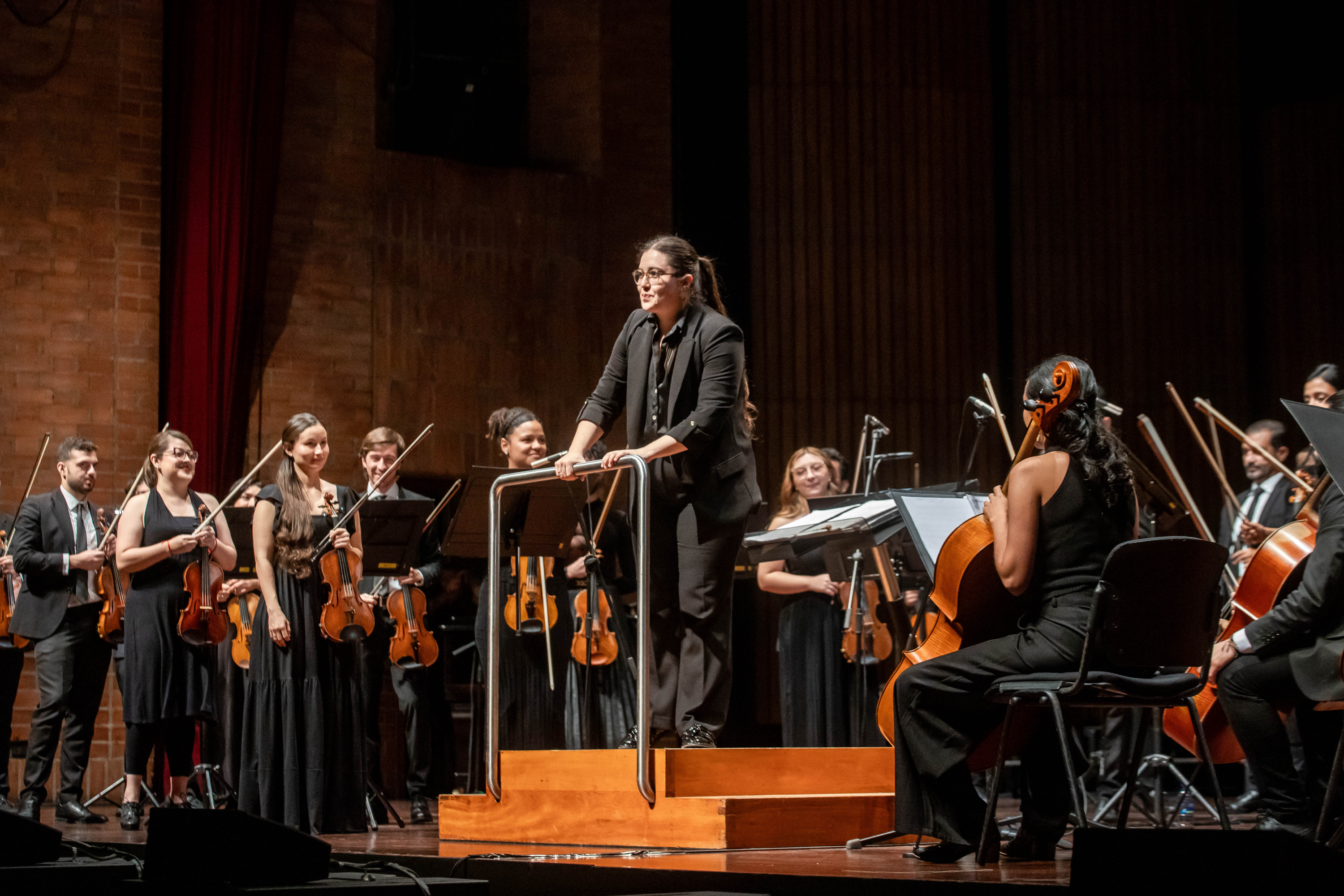The first female principal conductor of the Medellín Philharmonic arrives with a mission: to transform with music and care.

Ana María Patiño-Osorio's relationship with music began at home in La Unión, Antioquia. As a child, she would wake up every morning to her father's singing as he prepared panela water or coffee, and to a large home recording studio that alternated with symphonies by Mercedes Sosa and Silvio Rodríguez.
At the age of five, she entered the municipal music school; Saturday classes became the center of her week, and at seven, the saxophone was her first formal instrument. She soon began intuitively "leading" her school bandmates, moving her hands with genuine curiosity and a conviction that hasn't left her.
Her academic training led her to EAFIT University, where her first teacher was choral director Cecilia Espinosa. There, she met Alejandro Posada, with whom she worked for several years at the Iberacademy and the Colombian Youth Philharmonic.
He was also an assistant to Andrés Orozco-Estrada and considers the Spanish violinist and conductor Roberto González-Monjas to be his mentor.
Her breakthrough abroad came with a master's degree from the Zürcher Hochschule der Künste, under the renowned Johannes Schlefli. This combination of choral school, academic orchestra, and the demanding Swiss academic world shaped her playing field.
Two years ago, his schedule became almost entirely international: he has spent consecutive weeks in front of the Croatian Radio Orchestra, the RAI Philharmonic in Turin, and ensembles in Romania and Mexico.
However, she always dreamed of a lifelong friendship: a career in the world, constant work with young musicians, and a permanent connection to Medellín. Her appointment as the first principal conductor of the Medellín Philharmonic Orchestra (Filarmed) allows her, she says, to "return without disconnecting" and to build that balance.
Ana María Patiño-Osorio will be the first female principal conductor of the Medellín Philharmonic Orchestra. She will take office in November, replacing Israeli pianist David Greilsammer, who has been in charge since 2022.
In an interview with EL TIEMPO, Patiño-Osorio spoke about her plans to raise the Orchestra's profile internationally and the possibility of creating spaces that promote mental health.

Ana María had previously worked with the Medellín Philharmonic Orchestra as a guest conductor. Photo: JUAN CAICEDO B.
We're almost finished planning our next season, 2026, which will be both a transitional and daring one. There will be six weeks of intensive work with me at the helm, which will give us a much closer relationship.
We've developed a meaningful repertoire with a clear message that will strengthen the orchestra's flexibility and artistic discipline. We'll explore many styles so the group can grow in each. We'll amplify Colombian voices—established soloists abroad—maintain a connection with Medellín and Latin America, and feature high-caliber international guests.
In addition to the repertoire, you've insisted on adding a human element. What does that entail? I want to foster spaces for mental health care, not only for the musicians but also for the administrative team and, through our work, for the city. My goal is for coming to rehearsal to be a happy and safe experience; that requires openly discussing emotional and physical well-being. We will also remain connected to the community and work closely with the youth of Medellín.
Why did mental health become a pillar of your artistic project? I've been working on my own mental health for a long time, and I live with anxiety. Seeing it in a healthy way has made me a better conductor. I believe an essential part of my work is achieving the highest artistic level, but that starts with ensuring the well-being of the musicians. When they feel calm and free, the music flourishes. I also want the orchestra to be a breeding ground for emotional care practices in the city.
You've said that young people are another priority. What's the scope of that commitment? Orchestras should echo their surroundings. The Philharmonic is a gift to Medellín and also a responsibility: to help the city grow through music. I dream that everyone knows our musicians, goes to concerts, and sees us in the communities. This can only be achieved through a direct connection with young people; they are the future of the orchestra and recipients of generosity. I received a lot of support when I was a student, and the way I pay it forward is by opening doors for the next generation.
How does it feel to become Filarmed's first female principal director? It's an honor that the orchestra offered me this opportunity and to be able to accept it now that my schedule allows. I'm excited to be a role model for girls and teenagers who dream of conducting; I want Filarmed to be a safe, diverse, and open space. Every glass ceiling broken expands what's right and paves the way for other women. But inspiration must be tangible: next season will feature little-known composers here and highly talented female soloists.
What challenges persist for women in orchestral conducting? There has been enormous progress; the stories that Cecilia Espinosa experienced are nothing like my present. However, we need to give more visibility to soloists, composers, and conductors with a serious and professional approach. Over time, the change will be more profound, but we need real and rigorous opportunities to consolidate it.

Conductor Patiño-Osorio with her baton in hand, with the Medellín River in the background. Photo: Juan Manuel Chavarría.
I don't think it's about masculinizing or feminizing conducting, but rather about being yourself. Musicians can tell in a second when someone isn't authentic. I believe in team leadership, far removed from the authoritarianism of the past. I work with patience and calm, but also with determination and rigor. The range of options must be broad and true to the essence of each person, regardless of gender.
Finally, how will you balance your international agenda with your role in Medellín? I'll continue traveling: I already have commitments abroad for the coming years. But I'll have regular blocks of time in the city; it's crucial not to disconnect from Colombia. Being on world stages gives me experience that I can share with Filarmed. That balance between global exposure and local roots is my professional and personal ideal.
ANGELA MARÍA PÁEZ RODRÍGUEZ - SCHOOL OF MULTIMEDIA JOURNALISM EL TIEMPO.
eltiempo




%3Aformat(jpg)%3Aquality(99)%3Awatermark(f.elconfidencial.com%2Ffile%2Fbae%2Feea%2Ffde%2Fbaeeeafde1b3229287b0c008f7602058.png%2C0%2C275%2C1)%2Ff.elconfidencial.com%2Foriginal%2F908%2F21a%2F296%2F90821a296680e0d7699894c6592f6e32.jpg&w=3840&q=100)